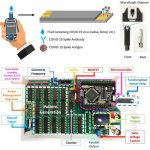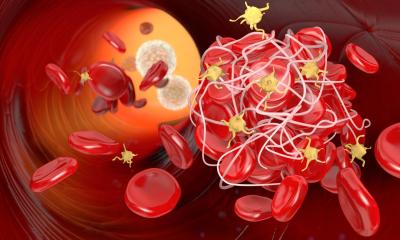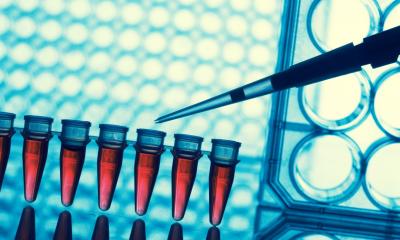Source: Robert Kruse
News • Covid-19
Rapid blood test detects vaccination
A team of Johns Hopkins researchers has developed a rapid blood test that could confirm a person has been vaccinated while they wait to board a plane or enter a sporting event.
Their Covid-19 antibody test is similar to one used at home to determine blood type, where the user pricks a finger and places a drop of blood on a card. A fusion protein developed by the research team is housed on the card and detects Covid-19 antibodies, tiny proteins in the blood the immune system produces to "remember" viral encounters and provide immunity to future infections. Results come back in less than five minutes, faster than current lateral flow tests to detect antibodies at point of care, while also potentially providing a clearer result.
Robert Kruse, M.D., Ph.D., who created the blood test, says it could be used to confirm a person's vaccination instead of having to show a vaccine card. "If a business is using the honor system for vaccinations, now they could test people on-site," he says.
Kruse is lead author of a paper posted online earlier this month that reported results of the test on 400 blood samples, half of which were from prior Covid-19 patients. The test correctly identified antibodies in previously infected patients 87.5% of the time, a slightly higher rate than ELISA tests performed in hospitals that require hours to perform. The paper is being peer-reviewed.
Recommended article

News • Coronavirus disease biomarkers
New Covid-19 testing method gives results within one second
The Covid-19 pandemic made it clear technological innovations were urgently needed to detect, treat, and prevent the SARS-CoV-2 virus. A year and a half into this epidemic, waves of successive outbreaks and the dire need for new medical solutions — especially testing — continue to exist. In the Journal of Vacuum Science & Technology B, researchers from the University of Florida and…
The test uses hemagglutination, in which the degree of clumping together of red blood cells reveals the concentration of antibodies. Kruse, a pathology resident at the Johns Hopkins University School of Medicine, said the hemagglutination results could let people know if they still have protection months after they received the vaccine or if they need a booster shot. The degree of hemagglutination also correlated with levels of neutralizing antibodies in patients, which protect against viral infection.
Immunocompromised patients, who studies have shown don't always respond to the COVID-19 vaccine, could test their antibody level and see if the vaccine is working for them, says Yuting Huang, M.D., Ph.D., Kruse's co-author and a research fellow at Johns Hopkins as well as chief resident of internal medicine at the University of Maryland Medical Center Midtown Campus.
Kruse and Huang developed the test in the lab of Zack Z. Wang, Ph.D., an associate professor at Johns Hopkins in the Division of Hematology. Kruse says the research is an example of the "Hopkins network coming through": Colleagues in pathology connected Kruse and Huang with researchers from the Johns Hopkins Bloomberg School of Public Health who already had patient samples and test results they were using for their own COVID-19 studies, allowing for collaboration and data-sharing.
"If those collaborating labs didn't have those samples, we wouldn't really have known how well it worked," says Kruse. Johns Hopkins Technology Ventures is seeking patent protection for the technology, which is available for licensing. The test's creators are seeking an industry collaborator to manufacture the cards and have applied for funding through TEDCO's Maryland Innovation Initiative to assist in commercializing its research.
Source: John Hopkins University
08.06.2021





